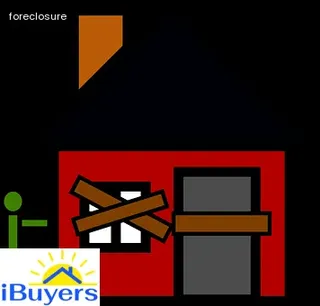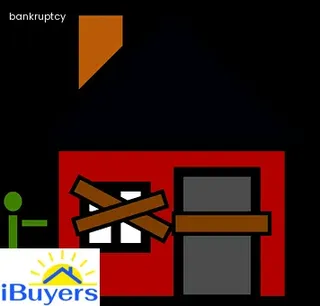Understanding the foreclosure process in Delaware is critical for those looking to stop their house from going into foreclosure. Foreclosure is a legal process that begins when the homeowner fails to make their mortgage payments on time, and it can be triggered by missed payments or other defaults on the loan.
In Delaware, foreclosures are handled through judicial proceedings rather than non-judicial means. This means that homeowners must go through the court system to settle foreclosure cases.
After filing a complaint with the court, a hearing will take place and the court will determine if any of the borrower's defenses are valid and if foreclosure should be granted. The borrower will then be given an opportunity to reinstate the loan or negotiate a settlement with their lender before they are forced out of their home.
Understanding Delaware's foreclosure laws and taking action early can help borrowers avoid losing their home.

Mortgage default in Delaware is an event that typically occurs when a homeowner fails to make their monthly mortgage payments for a period of time. The exact timeline depends on the loan agreement, but it is typically somewhere between three and six months.
During this time, the lender will contact the borrower to assess the situation and may offer alternative solutions such as forbearance or loan modification. If those options are not available or accepted, then foreclosure proceedings can begin in accordance with Delaware state law.
At that point, the lender can take possession of the home unless other arrangements are made. It's important to be aware of these timelines so that homeowners can take action before it's too late and explore ways to prevent foreclosure from happening in the first place.
In Delaware, the process for stopping a home from going into foreclosure begins with the property owner receiving a breach of contract notice. This document must be served to the homeowner by either delivering it in person or via registered mail.
The notice must include information related to the mortgage terms, details about the amount of debt that is owed, and an explanation as to why the lender believes there has been a breach of contract. After this breach of contract notice is received by the homeowner, they have 30 days to take action in order to stop their house from going into foreclosure.
This may include paying off any outstanding debts or engaging in negotiations with the lender in order to come up with a payment plan that satisfies both parties. It is important that homeowners understand their rights and obligations under Delaware foreclosure laws so that they can make informed decisions about how best to resolve any issues related to mortgage delinquency or default.

In Delaware, homeowners facing foreclosure must fulfill certain pre-foreclosure requirements before they can stop the process and keep their home. According to state law, lenders are required to provide borrowers with a written notice of default in order to initiate the foreclosure process.
This notice must include the amount owed, the date of delinquency, and an explanation of the rights and options available to the homeowner. Once this notice is served, a homeowner has ninety (90) days to cure the default or take action to prevent foreclosure.
During these ninety days, homeowners may enter into a repayment plan or loan modification agreement with their lender in order to regain good standing on their loan. Additionally, homeowners in Delaware can file for bankruptcy protection during this period as well.
Ultimately, it is important for homeowners facing foreclosure in Delaware to be aware of all legal options available so that they can take appropriate action within the ninety-day window and save their home from foreclosure.
If a homeowner in Delaware is facing foreclosure, the state offers several options to stop the foreclosure process and reinstate the mortgage. Through a reinstatement, the borrower pays all past due payments plus any additional fees or costs.
This must be done before a Notice of Foreclosure is issued by the lender. The amount owed must be paid in full, but if a homeowner is able to pay it off over time, they can enter into an agreement with their lender that outlines how much and when payments will be made until the amount is paid off in full.
In some cases, lenders may also agree to spread out payments over a longer period of time than originally agreed upon. Additionally, homeowners can request a loan modification which changes terms of their existing loan such as interest rate or length of repayment.
If approved by the lender, this will help make monthly payments more affordable for homeowners and reduce the risk of foreclosure. Homeowners should also be aware that there are many resources available to them for assistance with housing counseling services and legal advice about their rights and obligations regarding mortgage defaults in Delaware.

In Delaware, a homeowner has the right to reclaim their home within the redemption period following a foreclosure sale. The length of the redemption period depends on whether it is a judicial or non-judicial foreclosure and can range from none at all to up to six months.
During this time, the homeowner may have the option to pay off the full amount due and redeem their property. If they are able to satisfy the loan balance in full before the end of the redemption period, they can prevent further foreclosure proceedings from occurring and save their home from being lost.
A homeowner should always consult with an attorney or financial advisor prior to attempting a redemption of their home in order to ensure that all legal requirements for doing so are met. Additionally, there are other options available such as mortgage modification or deed in lieu of foreclosure which may help homeowners avoid having their house go into foreclosure altogether.
Bankruptcy and foreclosure are two of the most serious economic decisions a person can make in Delaware. Filing for bankruptcy may be the only way to prevent your home from being lost to foreclosure, as it can provide a legal avenue to temporarily suspend mortgage payments.
However, this is not always an option as filing for bankruptcy has long-term consequences. If you are able to maintain payments, then you may be able to avoid bankruptcy.
In Delaware, there are several laws in place that can help protect homeowners from going into foreclosure, such as loan modification programs or forbearance agreements. These programs allow borrowers to change the terms of their mortgages and reduce their monthly payments in order to stay in their homes.
Additionally, Delaware residents have access to free counseling services that can provide assistance with developing a budget and negotiating with lenders. By being proactive and taking advantage of all available resources, homeowners may be able to prevent their house from going into foreclosure in the first place.

When considering whether to let a house go into foreclosure in Delaware, it is important to understand both the pros and cons. On the one hand, letting a house go into foreclosure can be an easy way for homeowners to take care of a debt problem, as the lender will take ownership of the home and may forgive or renegotiate the loan.
On the other hand, this could lead to long-term financial problems, including a damaged credit score and difficulty securing future loans. Additionally, even if foreclosure proceedings are successful, any unpaid balances still remain due and owing.
Furthermore, potential buyers may be hesitant to purchase a foreclosed home due to liability issues or lack of clear title. Therefore it is important for homeowners facing foreclosure to become knowledgeable about their options and take proactive steps in order to stop their house from going into foreclosure in the first place.
When a homeowner in Delaware misses one or more mortgage payments, they will receive court notices from their lender. The first notice is typically an intent to foreclose, and the subsequent notices will include the date of the foreclosure sale, information about the right to redeem the property and details about who is responsible for fees associated with the foreclosure.
Homeowners should be aware that if they fail to respond within 30 days of receiving any notice, their home may proceed into foreclosure. All notices must be read carefully and it is important to act quickly upon receipt as not responding can lead to serious consequences.
Homeowners should also consider consulting with a lawyer as soon as possible as legal counsel may be able to provide advice on how to stop a house from going into foreclosure in Delaware.

In Delaware, homeowners have the right to cure a default under state law. This means that if a homeowner is in danger of having their house go into foreclosure, they can take steps to stop this from occurring.
As soon as the homeowner receives notice of a potential foreclosure due to a delinquent payment or other default on the mortgage, they can exercise their right to cure and work with their lender to make up the missed payments and reinstate their loan before any further foreclosure proceedings occur. In most cases, lenders are willing to work with borrowers to come up with an acceptable solution that will avoid foreclosure.
Homeowners should be aware of their rights and actively seek out ways to try and prevent foreclosure from happening in the first place. Taking action early on is essential for avoiding costly legal fees down the line.
Navigating Delaware foreclosure laws can be a complicated and overwhelming process, especially without legal counsel. If you are going through the foreclosure process in Delaware, it is important to consult with an experienced attorney who can provide advice on how to stop a house from going into foreclosure in the first place.
A lawyer can help you understand your rights under state law and negotiate any available options. They may also be able to advise you on ways to avoid repossession of your property, such as filing for bankruptcy or restructuring your loan.
Additionally, they can provide guidance on any other solutions that may be available to you so that you can make an informed decision about what is best for your situation. Working with an attorney throughout the entire foreclosure process will ensure that all of your interests are protected and that you have someone advocating for your rights at every step of the way.

The foreclosure process can be an intimidating experience for homeowners, but understanding the different stages is key to successfully navigating Delaware foreclosure laws. The first stage of foreclosure is when a homeowner defaults on their mortgage payments and the lender files a Notice of Default with the county recorder's office.
This public notice serves as an official warning that the lender will begin the legal process of taking back possession of the property if payments are not made up to date. The second stage of foreclosure is referred to as a “pre-foreclosure” period, during which time homeowners have an opportunity to bring their loan current by paying off all past due amounts or negotiate with the lender to establish a repayment plan.
If neither option is feasible, then homeowners can consider selling their home in order to cover any unpaid debts. The third and final stage of the foreclosure process occurs when a Notice of Sale is published in local newspapers and posted on the property itself.
At this point, lenders are legally authorized to sell the home at a public auction unless payment arrangements have been established prior to this date. It should be noted that even after this final step has been taken, it is still possible for homeowners to work out payment agreements with lenders in order to avoid losing their homes.
As a homeowner in Delaware, it's important to be aware of the foreclosure laws that are in place and what options are available for those who are facing foreclosure. Fortunately, there are several steps that can be taken to help prevent a home from entering into foreclosure in the first place.
To start, homeowners should contact their lender and explain their financial situation with as much detail as possible. Many lenders offer forbearance, which is an agreement between the lender and borrower to temporarily suspend or reduce mortgage payments for a set period of time.
Other options may include loan modification, refinancing, or repayment plans designed to bring the loan up-to-date. Additionally, consulting with a HUD-approved housing counselor can provide advice on budgeting and accessing other resources such as government assistance programs that could help bring back stability to a homeowner's finances.
Ultimately, these strategies can help homeowners avoid having their home enter into foreclosure in Delaware.

The best way to avoid or stop a foreclosure sale is to start by understanding Delaware's foreclosure process and laws. Before a home can be taken into foreclosure, there are certain steps that need to be taken by the lender.
The first step is for the lender to send a Notice of Default, which outlines all of the missed payments and must contain the contact information of a representative from the lender who can work with the homeowner on payment arrangements. At this point, homeowners have several options available to them.
They may negotiate with their lender for a repayment plan or loan modification, refinance with another lender, or try to sell the home in order to pay off the debt. If these options are not possible due to financial hardship, homeowners may also be eligible for assistance programs such as short sales and deed in lieu of foreclosure.
While foreclosure laws vary from state-to-state, it is important for homeowners facing foreclosure to become familiar with their rights under Delaware law and take advantage of any options available in order to prevent their home from going into foreclosure.
In Delaware, the process of foreclosure typically takes around two to three months from the time the homeowner receives a notice of default. In some cases, however, it can take much longer for a home to go into foreclosure depending on several factors including whether or not the loan holder is actively pursuing foreclosure proceedings.
The length of time it takes to foreclose on a house in Delaware depends on various aspects such as how long the owner has been delinquent on payments and if there is any dispute about legal ownership. Additionally, certain notices and mediation must be completed before a lender can begin the foreclosure process.
Homeowners who are behind in their payments should act quickly to attempt to resolve their delinquency issue and avoid foreclosure.

People let their house go into foreclosure for a variety of reasons. Economic instability, loss of a job, unexpected medical bills and other financial hardships can all put homeowners in a position where they cannot pay the mortgage on their home.
When revenues are no longer enough to cover the mortgage payments, homeowners may be forced to make difficult decisions about whether to continue making payments or risk going into foreclosure. Other homeowners may have been unable to secure additional financing when they needed it most, leaving them unable to meet their monthly mortgage obligations.
Additionally, some people may have taken out mortgages that they could not afford in the first place and now find themselves in an unmanageable situation with their lender. Navigating Delaware Foreclosure Laws can help individuals learn how to stop a house from going into foreclosure in the first place by understanding their options and taking proactive steps towards maintaining ownership of their property.
The foreclosure rate in Delaware has been increasing in recent years. According to RealtyTrac, one of the leading sources of foreclosure data, the state ranked sixth in the nation for foreclosure rates in October 2018.
The foreclosure rate was 0.55% of all housing units with a total of 1,099 properties that entered some stage of foreclosure during the month.
This is up from 0.48% and 994 properties entering some stage of foreclosure in October 2017.
The number of properties that received a foreclosure filing was also higher than it had been since January 2012 when 1,252 properties were receiving a filing. These numbers demonstrate that navigating Delaware's foreclosure laws is becoming increasingly important for homeowners who want to protect their property from being taken away through the legal process.
Understanding how to stop a house from going into foreclosure in the first place can help homeowners avoid this difficult situation altogether.
Delaware is a judicial foreclosure state, meaning that lenders must file a lawsuit against the borrower in order to repossess the property and sell it to pay off the mortgage. The court will then issue a judgment in favor of the lender if they can prove that the borrower has not kept up with their payments.
In order to avoid having your house go into foreclosure, Delaware homeowners must be aware of their rights and responsibilities under state foreclosure laws. Understanding how judicial foreclosures work and taking proactive steps such as seeking loan modification or forbearance can help borrowers prevent their homes from going into foreclosure.
It is also important for borrowers to act quickly when they first receive notice of a missed payment; responding immediately and staying in communication with their lender may help them avoid falling further behind on payments. Additionally, seeking legal advice from an experienced Delaware attorney who specializes in foreclosure law can provide insight into what options are available and how best to navigate the process.